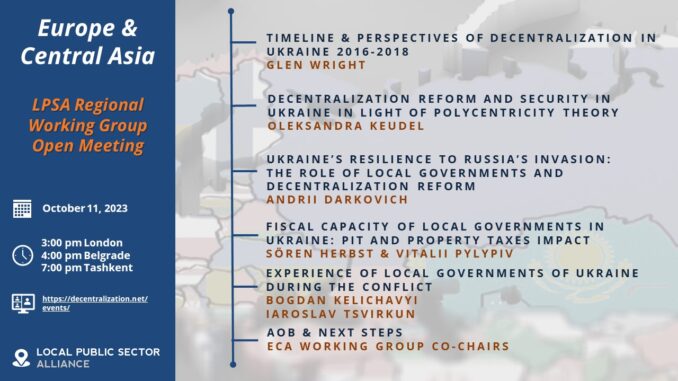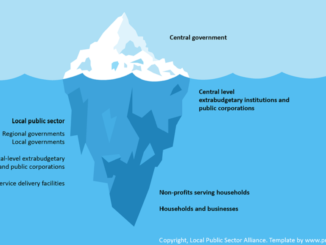
LPSA’s Regional Working Group on Europe & Central Asia (ECA) Open Meeting took place on October 11, 2023, (10:00 EDT/ 15:00 BST/ 16:00 CEST/19:00 UZT). The meeting was opened and moderated by Glen Wright, who serves as one of the co-chairs of the ECA Working Group. He referred to the timeline of decentralization and conflict in Ukraine and presented the results from the nationwide survey on decentralization in Ukraine 2016-2020.
Oleksandra Keudel, then followed up with insights into her study on how Ukraine’s decentralization reform and security under the polycentricity theory has played a crucial role in enhancing local governments resilience during the asymmetric war. Andrii Darkovich explained the resilience of local municipalities in Ukraine, focusing on factors such as skills of armed forces, unprecedented societal mobilization in Ukraine and external military and economic support. He identified the characteristics of local governments that help them achieve greater resilience to the invasion and drew differences between urban and rural local governments.
Sören Herbst and Vitalii Pylypiv presented the key findings and recommendations of the U-LEAD project research on PIT and Property Taxes and the impact on the financial capabilities of Local Governments in Ukraine. The research calculated a significant tax gap due to tax rate and base diffusion and developed recommendations to improve administration.
The mayors of two local governments in Ukraine provided valuable insights into the challenges they faced and the strategies they implemented to mitigate the impact of the conflict on their communities. Iaroslav Tsvirkun, Mayor of Pereshchepyn emphasized successfully implemented reform by centralized budgeting, generating investment resources, and fostering local businesses, while maintaining independence in decision-making processes. Bogdan Kelichavyi, Mayor of Kopychyntsi specified that Ukraine can leverage the subsidiarity principle to empower local governments to address community needs, promoting ownership, accountability and efficient decision-making. He pointed at that Ukrainians tend to “trust strangers horizontally, rather than friends vertically”, due to lack of communication with regional or district offices.
All the discussions were followed by Q&A sessions. Gábor Péteri concluded the meeting with scheduling the next quarterly meeting.
A video of the meeting is available on YouTube. The links below provide access to the video segments of the different agenda items.
| No. | Agenda Item | Contributor | Slide Deck |
| 1. | Introduction: Timeline of Decentralization and Conflict and the Perspective of Citizens on Decentralization in Ukraine 2016-2018 | Glen Wright | View |
| 2. | Decentralization Reform and Security in Light of Polycentricity Theory | Oleksandra Keudel | View |
| 3. | Explaining Ukraine’s Resilience to Russia’s Invasion: The Role of Local Governments and Decentralization Reform | Andrii Darkovich | View |
| 4. | Fiscal Capacity of Local Governments in Ukraine: PIT and Property Taxes Impact | Sören Herbst & Vitalii Pylypiv | View |
| 5. | Experience of Local Governments of Ukraine During the Conflict | Bogdan Kelichavyi & Iaroslav Tsvirkun | N/A |
| 6. | Any other business | Gábor Péteri | N/A |
Read a more information on the following links:
- “The Ukrainian flag hung over the city council during the occupation for 53 days” Interview with Mayor Serhiy Kaliman, Mayor of Vasylivka on impact of war on his village.
- How Municipalities of the Dnipropetrovsk region address food security?
- Organizing for Survival in Small-Town Ukraine
- Help centers for displaced person have been deployed in the Pereshchepynsk National Medical Centre
- Analysis of methods for assessing the capacity of territorial communities, conclusions, proposals
Reminder: You can join any LPSA Expert Working Group for free and receive reminders and updates by opting-in to one or more working group as part of your LPSA Membership registration.



